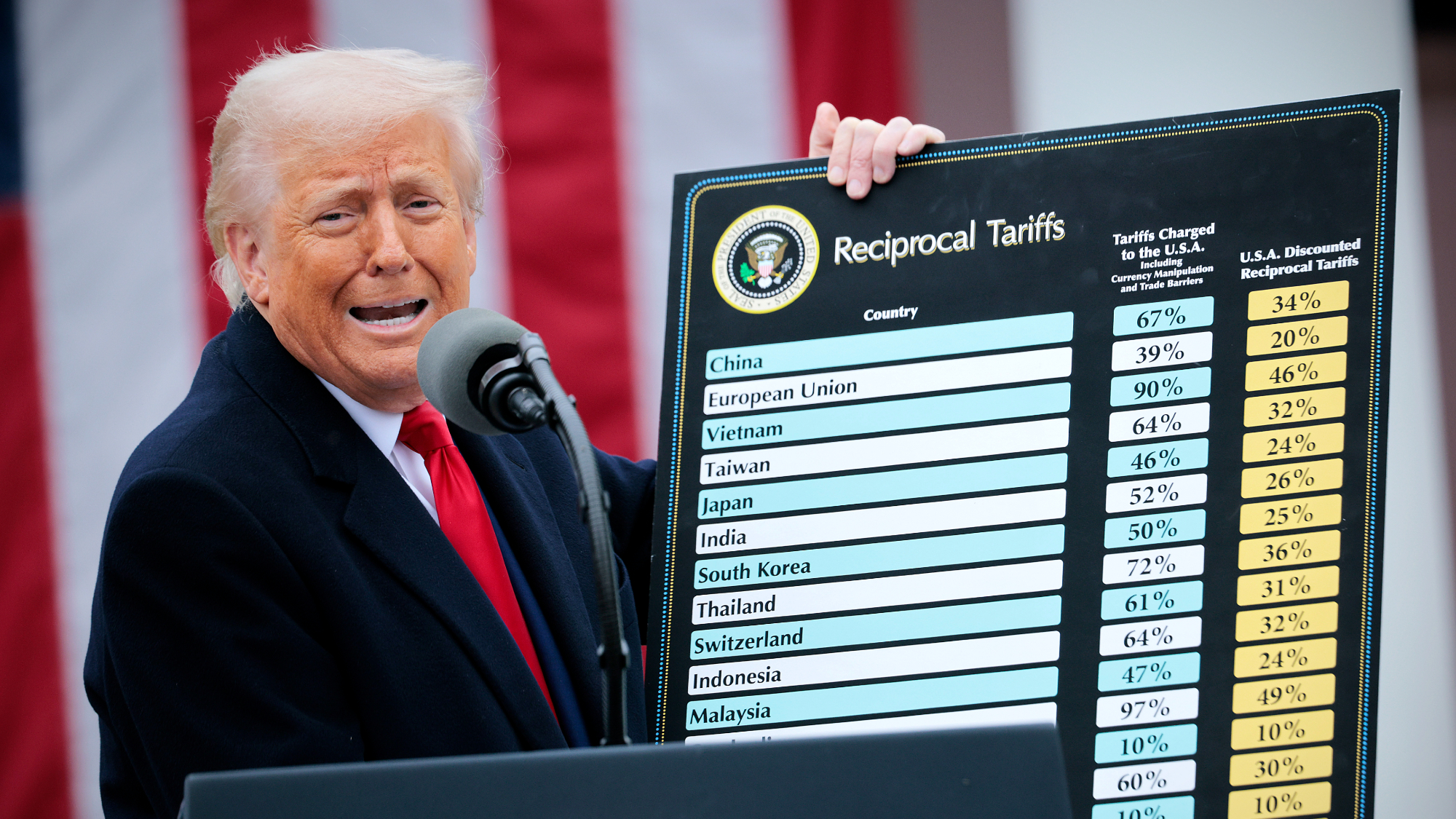US trade court nullifies Trump's biggest tariffs
The US Court of International Trade says Trump exceeded his authority in imposing global tariffs


A free daily email with the biggest news stories of the day – and the best features from TheWeek.com
You are now subscribed
Your newsletter sign-up was successful
What happened
The federal U.S. Court of International Trade Wednesday struck down President Donald Trump's sweeping tariffs against other countries. The bipartisan three-judge panel unanimously invalidated Trump's fentanyl-related and "Liberation Day" tariffs, and any other import taxes based on the International Emergency Economic Powers Act of 1977. His tariffs on steel, aluminum, cars and other specific industries, levied under a different law, are not affected by the ruling.
Who said what
The 1977 law "does not authorize the president to impose unbounded tariffs," the court said, and Trump's import taxes "exceed any authority granted" him by the law. The judges also agreed with the two sets of plaintiffs — a group of small businesses and 12 states — that trade deficits do not constitute an "unusual and extraordinary threat." No president had previously "sought to invoke" the emergency act "to impose tariffs on other nations," The New York Times said. The law "does not even mention tariffs."
"This ruling reaffirms that our laws matter, and that trade decisions can't be made on the president's whim," said Oregon Attorney General Dan Rayfield, who led the states' lawsuit. The decision "blows a giant hole through Trump's strategy to use steep tariffs to wring concessions from trading partners," Reuters said. That "may be a very dandy plan," Senior Judge Jane Restani, a Ronald Reagan appointee, said in oral arguments, "but it has to meet the statute."
The Week
Escape your echo chamber. Get the facts behind the news, plus analysis from multiple perspectives.

Sign up for The Week's Free Newsletters
From our morning news briefing to a weekly Good News Newsletter, get the best of The Week delivered directly to your inbox.
From our morning news briefing to a weekly Good News Newsletter, get the best of The Week delivered directly to your inbox.
Wall Street cheered the decision, with the dollar strengthening and Asian markets and U.S. stock futures rising after it was handed down Wednesday evening. The White House immediately filed a notice of appeal. "It is not for unelected judges to decide how to properly address a national emergency," spokesperson Kash Patel said in a statement.
What next?
The New York-based trade court gave the Trump administration 10 days to order a halt to the tariffs. The government may also "have to pay back duties it has already collected," Politico said. The ruling can be appealed to the U.S. Court of Appeals for the Federal Circuit — a specialized court that deals largely with patent and trademark law — and ultimately to the Supreme Court.
A free daily email with the biggest news stories of the day – and the best features from TheWeek.com
Peter has worked as a news and culture writer and editor at The Week since the site's launch in 2008. He covers politics, world affairs, religion and cultural currents. His journalism career began as a copy editor at a financial newswire and has included editorial positions at The New York Times Magazine, Facts on File, and Oregon State University.
-
 The ‘ravenous’ demand for Cornish minerals
The ‘ravenous’ demand for Cornish mineralsUnder the Radar Growing need for critical minerals to power tech has intensified ‘appetite’ for lithium, which could be a ‘huge boon’ for local economy
-
 Why are election experts taking Trump’s midterm threats seriously?
Why are election experts taking Trump’s midterm threats seriously?IN THE SPOTLIGHT As the president muses about polling place deployments and a centralized electoral system aimed at one-party control, lawmakers are taking this administration at its word
-
 ‘Restaurateurs have become millionaires’
‘Restaurateurs have become millionaires’Instant Opinion Opinion, comment and editorials of the day
-
 Why are election experts taking Trump’s midterm threats seriously?
Why are election experts taking Trump’s midterm threats seriously?IN THE SPOTLIGHT As the president muses about polling place deployments and a centralized electoral system aimed at one-party control, lawmakers are taking this administration at its word
-
 ‘Restaurateurs have become millionaires’
‘Restaurateurs have become millionaires’Instant Opinion Opinion, comment and editorials of the day
-
 NIH director Bhattacharya tapped as acting CDC head
NIH director Bhattacharya tapped as acting CDC headSpeed Read Jay Bhattacharya, a critic of the CDC’s Covid-19 response, will now lead the Centers for Disease Control and Prevention
-
 Should the EU and UK join Trump’s board of peace?
Should the EU and UK join Trump’s board of peace?Today's Big Question After rushing to praise the initiative European leaders are now alarmed
-
 Witkoff and Kushner tackle Ukraine, Iran in Geneva
Witkoff and Kushner tackle Ukraine, Iran in GenevaSpeed Read Steve Witkoff and Jared Kushner held negotiations aimed at securing a nuclear deal with Iran and an end to Russia’s war in Ukraine
-
 Pentagon spokesperson forced out as DHS’s resigns
Pentagon spokesperson forced out as DHS’s resignsSpeed Read Senior military adviser Col. David Butler was fired by Pete Hegseth and Homeland Security spokesperson Tricia McLaughlin is resigning
-
 Judge orders Washington slavery exhibit restored
Judge orders Washington slavery exhibit restoredSpeed Read The Trump administration took down displays about slavery at the President’s House Site in Philadelphia
-
 Kurt Olsen: Trump’s ‘Stop the Steal’ lawyer playing a major White House role
Kurt Olsen: Trump’s ‘Stop the Steal’ lawyer playing a major White House roleIn the Spotlight Olsen reportedly has access to significant US intelligence
